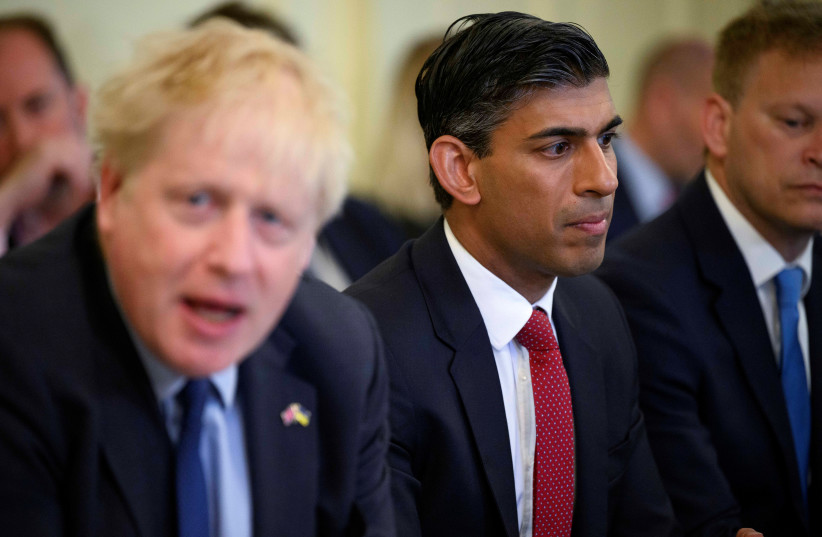The Guardian apologized on Saturday for an antisemitic cartoon depicting Jewish ex-BBC chairman Richard Sharp that the paper published.
The cartoon was made after Sharp quit as chairman of the BBC when it was revealed that he had failed to disclose that former prime minister Boris Johnson had secured an £800,000 loan with Sharp's help.
The cartoon features a caricature of Johnson sitting naked atop a mound of garbage with sacks of money, saying "cheer up, matey! I put you down for a peerage in my resignation honours list" to a caricature of Sharp who can be seen carrying a box of belongings and a CV. The box is clearly a Goldman Sachs box and seems to be full of gold coins. Two other objects can be seen in the box - a squid and a head with a massive nose that seems to be wearing a black kippa.
Dave Rich, an author who specializes in antisemitic issues said that squids are a "common antisemitic motif" that relates to antisemitic conspiracy theories that Jews have tentacles wrapped around those they want to control.
"You might argue that outsized facial features and tentacles are common to other topics too, so it's just a cartoon thing," he said. "Except where something has a long and familiar antisemitic history, it takes on a different meaning when you apply it to Jews."
"You might argue that outsized facial features and tentacles are common to other topics too, so it's just a cartoon thing. Except where something has a long and familiar antisemitic history, it takes on a different meaning when you apply it to Jews."
Dave Rich

<em>The Guardian</em>'s antisemitic cartoon was met with much backlash
The cartoon drew much criticism from the British-Jewish community as well as politicians on both sides of the spectrum.
Johnson said on Saturday that Martin Rowson, who drew the cartoon, ought to resign over the image, according to the Daily Mail.
"Frankly, whoever commissioned and printed this has made a far worse mistake than Richard Sharp," he said. "They should take his lead."
"It is extraordinary that so many classic anti-Jewish motifs were squeezed into one cartoon without The Guardian editors objecting," said co-director of Labour Against Antisemitism Alex Hearn.
"It takes a lot to shock me," said former Jewish Chronicle editor Stephen Pollard. "And I am well aware of the Guardian's and especially Rowson's form. But I still find it genuinely shocking that not a single person looked at this and said, no, we can't run this. To me, that's the real issue."
Following the backlash garnered from the cartoon, The Guardian made a statement on Saturday apologizing for it.
"We understand the concerns that have been raised," said a spokesperson for the publication. "This cartoon does not meet our editorial standards, and we have decided to remove it from our website. The Guardian apologizes to Mr. Sharp, to the Jewish community and to anyone offended."
"This cartoon does not meet our editorial standards, and we have decided to remove it from our website."
The Guardian
Rowson later uploaded a statement to his personal website saying that he had not intended for the cartoon to be received in this way.
"The portrayal of Sharp takes up 3% of the overall image," he wrote. "I was trying to draw him looking silently furious, by implication with Johnson, in the standard caricatural way common to all political cartoons of exaggerating various of his features."
He added that Sharp was meant to appear as a much more mild caricature than Johnson appeared in the cartoon.
Rowson went on to admit that he knew Sharp was Jewish and said that the two had attended school together.
"His Jewishness never crossed my mind as I drew him as it’s wholly irrelevant to the story or his actions, and it played no conscious role in how I twisted his features according to the standard cartooning playbook," he wrote.
He ended his statement with an apology for his cartoon "offending the wrong people" and a promise to be more meaningful in his future cartoons.
